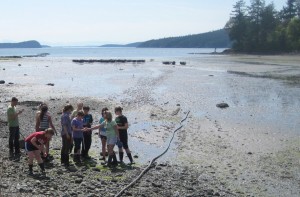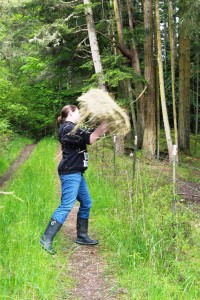…and so many other things!
— by Madie Murray —
Some of the most memorable experiences for young people on Orcas Island are those found on a working farm, whether it’s digging clams, pitching hay, shearing sheep or gathering eggs.
These types of learning experiences, among others, are a reality for the new Middle School Farm to Classroom students funded by generous donors to the Orcas Island Education Foundation. Since the class is an exploratory class, it is two hours or more long which affords them the time to venture off campus for these unique experiences. Here are some of the places they have visited and activities they have participated in so far this year…
Buck Bay Shellfish Farm: On a beautiful day in early May, owner of the farm located in Olga, Toni Hermansen, talked a bit about oysters and other shellfish, their habitats and the process of farming them, then took the class tromping in very deep mud far out into the beds and beyond for a truly unique hands-on experience. “These kids were really engaged,” Hermansen said, “and it was a lot of fun showing them how our farm works.” It seems that not only the kids but those who share their farms are rewarded.
Our Lady of the Rock Monastery farm – Shaw Island: “This was a great opportunity for the kids to see a working subsistence-type farm, which was the goal of the trip,” says Middle School Farm to Classroom teacher, Jennifer Pietsch. The farm raises heritage breeds of animals, not only for their own consumption but as breeding stock for other farms nationwide. The Monastery also has a certified raw milk dairy and produces some fantastic cheeses. The kids saw all of this up close and personal and helped the Mothers the entire morning they were there. “The women of Our Lady of the Rock are the real deal,” says Pietsch.
Orcas Moon Alpacas: This is Jennifer and Jeff Pietsch’s own farm on Dolphin Bay Road. They raise alpacas and sheep. On this visit they learned about how fleece goes from animal to product, how breeding affects the end product, and how to use all of the products produced by these animals. They also observed sheep shearing, which is something not many people experience.
The students are also building a worm composter for the school garden under the tutelage of Steve Diepenbrock of Morning Star Farm. In the process, they are learning all about cultivating worms, their habits, habitats and immense benefit to gardens. This composter will also be used to compost some of the school food waste. This project is especially great because it is one that will also facilitate learning in the K-6 Farm to Classroom.
Last fall, the class had other great experiences learning about:
• The process of preserving foods, including the chemical processes that makes it happen by collecting plums from a local farm and making it into jam.
• Making cheese including the chemical processes that make it happen; they made mozzarella.
• Small scale poultry farming at West Beach Farm, including costs, benefits and challenges associated with it;
• All aspects of orchards at Warm Valley Farm;
• Production farming and how one operates at Morning Star Farm.
A very special and heartfelt thanks to all of the local farmers and community members that take time out of their extremely busy schedules to share their expertise; and do so enthusiastically and without compensation.
Stay on top of everything Farm to Cafeteria and Farm to Classroom by visiting our facebook page at www.facebook.com/orcasislandf2c, the web site at www.orcasislandf2c.org, and/or subscribing to our e-bulletin for periodic news and updates by clicking here.
**If you are reading theOrcasonian for free, thank your fellow islanders. If you would like to support theOrcasonian CLICK HERE to set your modestly-priced, voluntary subscription. Otherwise, no worries; we’re happy to share with you.**









